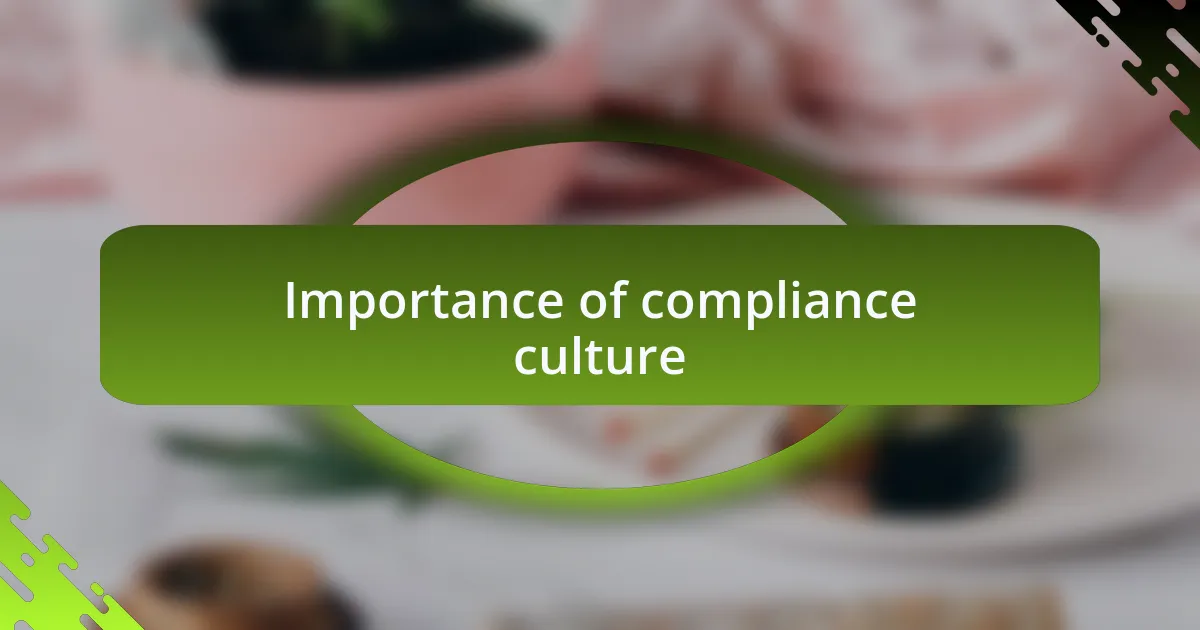Key takeaways:
- Compliance in cannabis retail involves navigating complex regulations that vary by state and municipality, highlighting the need for continuous education and vigilance.
- Building a compliance culture enhances integrity, accountability, and team empowerment, as demonstrated by a team member addressing an inventory inconsistency.
- Effective communication and training are crucial for overcoming resistance to compliance initiatives and ensuring that team members understand the importance of regulations.
- Feedback from employees is essential for improving compliance training, making it more relevant and interactive, which in turn fosters a collaborative environment.

Understanding compliance in cannabis retail
Navigating compliance in cannabis retail can feel like walking through a labyrinth. I vividly remember my first experience with the staggering lists of regulations; it was overwhelming and frankly a bit daunting. I often asked myself, “How am I supposed to keep up with all of this?” The reality is, compliance requirements can vary not just between states, but even within municipalities, making it essential for retailers to stay informed and adaptable.
Understanding what compliance really means goes beyond just ticking boxes. It’s about instilling a culture of accountability and safety among your team. I recall a time when a minor oversight in labeling nearly became a major issue. This experience taught me that attention to detail is not just about regulations; it reflects our commitment to our customers and the community.
The emotional weight of compliance cannot be overlooked. Each regulation is a reminder of the responsibility we carry, both legally and ethically. I often reflect on the deep trust our customers place in us; how can we honor that trust if we don’t fully embrace compliance? It’s a partnership, one that requires ongoing education and a willingness to learn from both successes and mistakes.

Importance of compliance culture
Building a compliance culture is vital not just for legal reasons, but for fostering a sense of integrity within the organization. I remember a training session where we discussed scenarios around compliance failures. One of my team members shared a story about a friend who faced serious repercussions for ignoring minor regulations. Listening to that, I realized how deeply compliance efforts can impact not only our business but also the lives of our employees and the community we serve.
When I think about the importance of a compliance culture, I picture an environment where everyone feels responsible for upholding standards. A few months back, a new staff member pointed out an inconsistency in our inventory process. Instead of brushing it off, we reviewed the procedure together, which reminded me how a strong compliance culture empowers individuals to speak up. Isn’t it remarkable how a simple act of vigilance can prevent potential issues before they arise?
Furthermore, a robust compliance culture builds trust; it positions your business as a leader in the industry. I’ve seen customers respond positively when they know we prioritize compliance—it reassures them of our commitment to quality and safety. What would happen to our reputation if we didn’t take compliance seriously? This question often guides my decision-making, underscoring just how integral compliance is to sustainable growth and customer loyalty.

My personal compliance journey
When I embarked on my compliance journey, I was both excited and apprehensive. I clearly remember my first compliance audit—my heart raced as we prepared all necessary documentation. The experience taught me that being organized and transparent in our practices wasn’t just beneficial for passing the audit; it was crucial for building a solid foundation for our company’s integrity. How could we expect to demonstrate accountability if we weren’t prepared?
As I navigated my journey, I encountered challenges that tested my commitment to compliance. There was an instance when I discovered a minor labeling error that could have led to significant miscommunication with our customers. Instead of dismissing it as a trivial issue, I chose to address it openly. It was then that I truly understood the value of vigilance—ensuring even the smallest details didn’t undermine the trust we worked so hard to build.
Each step of the way, I sought guidance and shared my learnings with my team. In one memorable meeting, we collaboratively brainstormed a new compliance training program. It was incredible to witness everyone’s enthusiasm; we weren’t just checking a box; we were creating a culture rooted in accountability. I realized that fostering this environment wasn’t merely about following regulations—it was about inspiring a collective commitment to excellence. Isn’t that what we all strive for in our professional lives?

Challenges faced during implementation
One significant challenge I faced during the implementation of a compliance culture was resistance from team members who felt overwhelmed by the new regulations. I remember during a team meeting, the sighs and furrowed brows as we discussed compliance protocols. It struck me that compliance could feel like an extra burden rather than a guiding principle. So, I made it a point to connect the dots between compliance and our values—how this new approach wouldn’t just keep us above board, but also enhance our brand integrity.
Another hurdle was keeping everyone on the same page amid rapid changes in regulations within the cannabis industry. I can recall a frantic week where a new state policy came out, and I had to scramble to update our team on procedures. The uncertainty created anxiety, and I soon realized that communication was vital. I started holding weekly check-ins to address concerns and clarify changes. This not only helped alleviate stress but fostered a sense of teamwork that turned obstacles into collective challenges we faced together.
Lastly, measuring the effectiveness of our compliance initiatives proved to be trickier than I anticipated. I once led a review meeting where we realized our training sessions weren’t translating into the desired actions on the shop floor. It made me reflect on the practicalities of compliance—how do we ensure that our team’s understanding truly manifests in their daily work? This realization pushed me to incorporate hands-on training, bridging the gap between theory and practice, as I believe that real learning happens when people can see the relevance in their daily tasks.

Lessons learned in compliance
One of the key lessons I’ve learned in building a compliance culture is the importance of clarity. I remember sitting down with a confused employee who struggled to understand why certain protocols were necessary. It hit me that if someone was feeling lost, surely others were as well. This experience taught me to simplify our compliance materials. Clear, straightforward communication has become my mantra; when everyone understands the “why” behind compliance, it fosters a collective commitment rather than compliance being seen as a chore.
Additionally, I’ve come to appreciate the value of feedback. Early on, I initiated anonymous surveys to gauge how well our compliance training was resonating with the team. The results were eye-opening. Some employees shared that they felt the training sessions were too theoretical and disconnected from their roles. This feedback led me to revamp our training, making it more interactive and relatable. The shift not only boosted engagement but also strengthened trust within the team, showing that compliance growth is a journey we take together.
I’ve also realized that compliance culture thrives on leadership visibility. I made it a point to model compliance behavior myself, whether it was ensuring accurate record-keeping or adhering to safety guidelines. I noticed that when I was transparent about my compliance efforts—sharing both successes and missteps—others felt encouraged to do the same. This openness created a safe space for discussions about compliance challenges, proving that vulnerability can be a powerful tool in fostering a culture of accountability and learning.